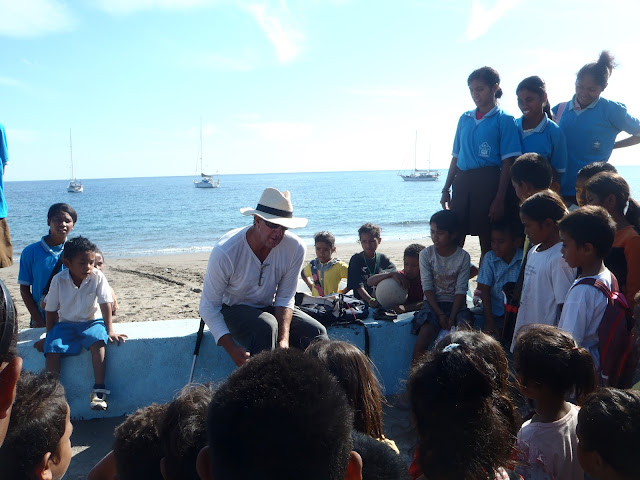 |
| "Yeah, this anchorage is cool!" |
TELUK HADING
It
was time to get in to some proper cruising so we decided to get off the beaten
track and divert from the path followed by many of the Sail Indonesia boats.
Teluk Hading is a bay nestled under a big hook on the island of Flores. (Check it out on the Location tab). I
studied our charts and found a smaller bay tucked right in the eastern most
corner, guarded by a big reef that stretched right across the entrance. It
looked like there was a channel on the north side about 80 metres wide. The
charts of Indonesia are not that detailed in the more remote places and they
can be quite inaccurate. They are often based on surveys done by the Dutch in
the 1800s, so navigating must be done with extreme care.
It
did look clear and deep on the chart so we gingerly approached the bay. Our hunch
was correct, the channel never dropped below 20metres in depth and the reef
could be seen clearly as a change in colour from dark blue to light green. It
was a perfect bay with a huge reef protecting it from any wind direction. A
couple of fishermen in canoes gave us some guidance as to where to anchor and
we dropped anchor in 18 metres of water. Yes, we are getting used to these deep
anchorages now. We have 60 metres of chain attached to our anchor and we often
have to put all of it out.
The
anchorage was perfect. It was surrounded by dense mangroves backed by high
mountains and it was so still and quiet we felt like we were tied up at a
marina. We got busy and did a few chores that we had been putting off, such as
replacing missing sail slides, readjusting the reefing line and a few loads of
washing. The locals obviously not used to many visitors, kept their distance.
We couldn’t see any village but there was a tell tale wisp of smoke wafting
through the coconut palms. We asked a passing fisherman if it was OK to visit
the village and he pointed in the direction of the mangroves. We were running
very low on fresh vegetables and hoped to be able to buy some. We soon had an
escort of kids in two canoes. One joined us on our dinghy and acted as our
guide. The others we finished up towing behind us, as their paddling was no
match for the outboard.
 |
| The entrance to the village. |
We
snaked our way through a narrow passage in the mangroves and eventually landed
on a muddy bank where other canoes were beached. On shore we were greeted by a
throng of kids and we asked a woman who was processing sugar if it was OK to go
to the village. We made our way along a rough muddy path to the village, called
Mata, where we were adopted by a woman who had a tiny bit of English. She had
worked in Malaysia for a while and picked up a little English. With her tiny
bit of English and my halting Indonesian and extensive use of my phrase book,
we managed to communicate reasonably well. She confided that she had lost four
baby girls.
 |
| Processing sugar |
We
were guided around the village and admired the cute houses, the pigs with
piglets, the goats, chickens and tethered cows all the time surrounded by a
throng of kids. Rob looked like the Pied Piper, the kids adored him. We visited
our guide’s brother who was the leader of the village and sat in his house for
a while and gave him our address and phone number. A stop at our guide’s house
was a little concerning as she gave us a glass of water each. Every guide book
says “Do NOT drink the water” but what can you do? It would be so impolite to
refuse. She must have picked up on our exchanged glances and said “Everything
OK?” “Sure, no problems” we said, as we drank down the water and wished each
other adios.
 |
| Rob, the Pied Piper |
We
were followed back to the boat by two canoe loads of boys, our new friend and
her brother in an outrigger canoe. . We returned their hospitality and invited
them on the boat where we gave them iced tea and the boys, cordial. They looked
a bit wide eyed and said it was like a house. It was probably something right
out of their realm of experience.
 |
| Our guide outside her house |
As
the sun set on another adventurous day we were exhausted but happy as we
toasted this amazing cruising life. Diana.
PS.
No ill effects from the water!
 |
| Kids fare welling us from the mangrove driveway. |




































.JPG)
.JPG)
.JPG)
.JPG)






